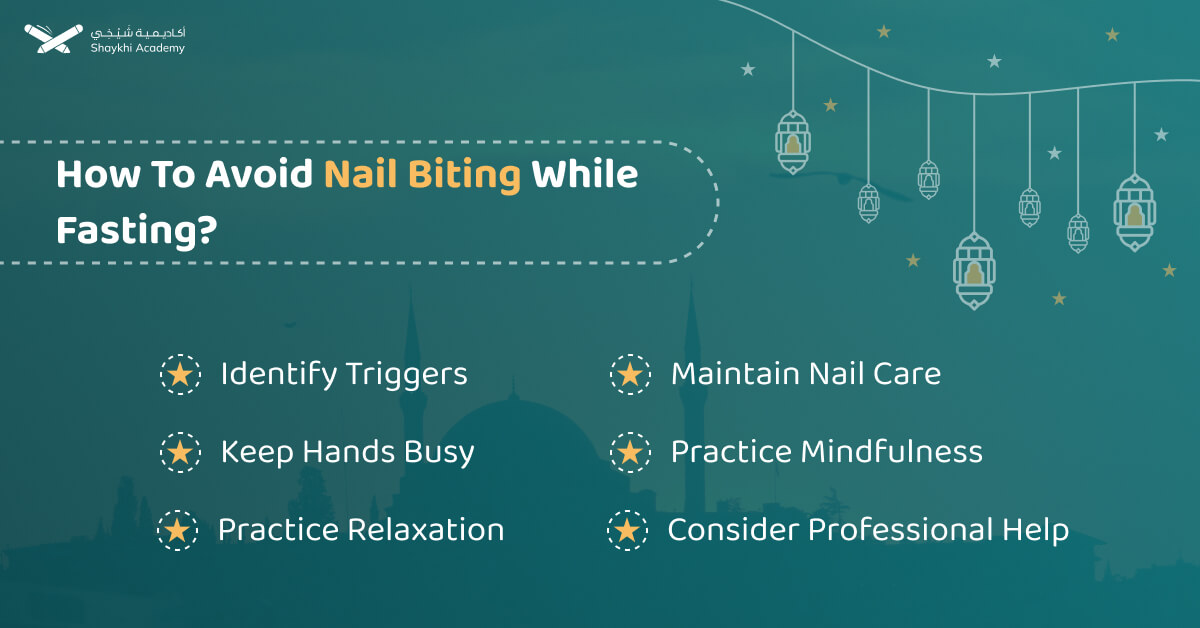Can you bite your nails during Ramadan? biting your nails does not break your fast unless you intentionally swallow something. However, it’s a habit worth breaking for both health and personal well-being. By incorporating behavioral exercises, relaxation techniques, and seeking professional help if needed, you can overcome this habit.
Ramadan, the holiest month in Islam, is a period of fasting, prayer, reflection, and community for Muslims worldwide. During this month, Muslims strive for spiritual growth and self-discipline.
However, certain questions arise regarding behaviors that might not directly involve consuming food or drink, such as nail-biting. In this article, we delve into the question: Can you bite your nails during Ramadan? Is nail biting permissible? Let’s explore this query within the context of Islamic guidelines and practices.
Defining Nail Biting and its Ruling From a Shariah Perspective
Nail biting, medically known as onychophagia, is a habitual behavior characterized by the repetitive biting or chewing of one’s fingernails or toenails. It is a common phenomenon observed across various age groups, though it is often more prevalent among children and adolescents.
The act of nail biting typically involves the individual using their teeth to gnaw at the nails, resulting in the trimming or tearing of the nail tissue. This behavior may occur intermittently or persistently, depending on factors such as stress, anxiety, boredom, or nervousness.
Nail biting can manifest in various forms, ranging from mild to severe. In mild cases, individuals may engage in occasional nail biting during moments of stress or tension. However, in severe cases, nail biting may become a compulsive habit, occurring frequently and persistently despite efforts to stop.
From a Shariah perspective, nail biting is generally considered undesirable but not explicitly prohibited unless it leads to harm or involves the ingestion of nail fragments or blood.
Does Biting Nails Break Fast During Ramadan?
According to Islamic scholars, biting your nails does not break your fast, as long as you do not intentionally swallow any of the nail fragments. However, it is strongly advised to avoid this habit altogether, as it can have negative health implications. But keep in mind the following, while biting nails may not nullify the fast from the perspective of jurisprudential rulings, it is advisable for Muslims to refrain from this habit during Ramadan and throughout the year.
So, while the act of biting nails itself may not inherently invalidate one’s fast, there are broader considerations beyond the mere technicalities of fasting rules. Islamic teachings emphasize the preservation of health and well-being as fundamental principles. The Prophet Muhammad (peace be upon him) imparted wisdom regarding the avoidance of harm to oneself and others.
It was narrated from ‘Ubadah bin Samit that the Messenger of Allah (ﷺ) ruled:
“There should be neither harming nor reciprocating harm.”
Sunan Ibn Majah
What If You Accidentally Swallow Nail Fragments While Fasting?
If you accidentally swallow nail fragments while fasting, your fast remains valid as long as it was unintentional. However, if you deliberately swallow anything, including nail fragments, your fast is broken and would need to be made up later.
Why Should You Avoid Biting Nails?
Nail-biting is often a nervous habit, linked to stress or anxiety, and can persist from childhood into adulthood. Beyond its potential to harm your health, it is considered a behavior that should be addressed for personal well-being. Experts suggest that breaking this habit requires a combination of behavioral exercises and relaxation techniques.
In the context of nail-biting, medical experts have highlighted potential risks associated with the habit. Biting nails can lead to various health issues, including:
- Infections.
- Damage to the nail bed.
- The spread of bacteria.
- Ingesting nail fragments or blood, albeit unintentionally, can pose health hazards.
Specialist doctors often advise against nail biting due to its potential adverse effects on oral health, as well as the risk of introducing harmful bacteria into the body. Additionally, chronic nail biting can result in unsightly nails, discomfort, and even pain.
Considering the holistic approach of Islam towards health and well-being, Muslims are encouraged to adopt habits and practices that promote physical, mental, and spiritual wellness. While biting one’s nails may not directly invalidate the fast, it is prudent for individuals to refrain from such habits during Ramadan and beyond.

How Can One Avoid Nail Biting While Fasting?
Avoiding nail biting while fasting, particularly in the sacred month of Ramadan, requires a combination of strategies aimed at addressing both the physical habit and underlying triggers. Here are some practical tips to help individuals refrain from nail biting during fasting hours:
- Identify Triggers: Recognize what prompts you to bite nails, such as stress or boredom.
- Keep Hands Busy: Occupy your hands with activities like squeezing a stress ball or engaging in a hobby.
- Maintain Nail Care: Keep nails trimmed to reduce temptation.
- Use Bitter-Tasting Nail Polish: Apply deterrent nail polish to discourage biting.
- Practice Mindfulness: Stay aware of your actions and take deep breaths when tempted.
- Substitute with Healthy Habits: Chew gum or snack on vegetables to keep hands and mouth busy.
- Seek Support: Lean on friends or family for encouragement and accountability.
- Practice Relaxation: Incorporate techniques like deep breathing or meditation to reduce stress.
- Set Realistic Goals: Celebrate progress and be patient with yourself.
- Consider Professional Help: Seek guidance if nail biting persists despite efforts to stop.
By following these steps, you can break the habit of nail-biting during fasting, promoting both physical and spiritual well-being during Ramadan.
Practical Advice for Nail Care During Ramadan
As a precautionary measure, Muslims are advised to refrain from nail biting during fasting hours in Ramadan. While it may not necessarily invalidate the fast, it is preferable to avoid actions that may raise doubts about its validity. Engaging in activities that promote mindfulness, relaxation, and stress reduction can help individuals curb the habit of nail biting.
Ramadan presents an opportunity for individuals to cultivate self-discipline and strengthen their willpower. Instead of succumbing to habits like nail biting, Muslims are encouraged to redirect their focus towards acts of worship, Quranic recitation, and charitable deeds. By harnessing the spirit of Ramadan, believers can overcome challenges and elevate their spiritual consciousness.

Revitalize Your Relationship with the Qur’an With Shaykhi Academy!
At Shaykhi Academy, we understand the challenges that may have hindered your progress in memorizing the Qur’an. Whether it’s a busy work schedule, household responsibilities, or previous unsuccessful attempts at memorization, we’re here to provide tailored solutions to help you succeed.
What sets Shaykhi Academy apart? Our team comprises highly qualified Quran teachers, many of whom are graduates of esteemed institutions like Al-Azhar University. With a focus on perfecting Tajweed and ensuring accurate transmission of the Qur’an, our teachers are equipped to deliver the teachings of the Holy Book effectively.
Moreover, our approach is not limited to adults. We offer specialized courses for children, taught by experienced educators who understand the diverse needs and learning styles of young learners.
Make this Ramadan a new beginning in your journey with the Qur’an. Join Shaykhi Academy and experience the difference firsthand. Book your free trial and start your transformative journey today.

Conclusion:
In conclusion, the question of whether one can bite their nails during Ramadan arises within the context of Islamic guidelines and practices, especially during a month dedicated to fasting, prayer, and spiritual reflection. While nail biting itself may not invalidate the fast from a technical standpoint, broader considerations of health, well-being, and Islamic teachings come into play.
Islamic teachings emphasize the preservation of health and the avoidance of harm to oneself and others. While biting nails may not directly harm one’s fast, it can have adverse effects on physical health, including the risk of infections and oral health issues. Therefore, Muslims are encouraged to refrain from habits like nail biting during Ramadan and beyond, aligning with the holistic approach of Islam towards wellness.
Practical strategies to avoid nail biting during fasting hours include identifying triggers, keeping hands busy, maintaining nail care, using deterrent nail polish, practicing mindfulness, and seeking support from friends or family. By adopting these approaches, individuals can break the habit of nail biting and focus on spiritual growth during Ramadan.

















































